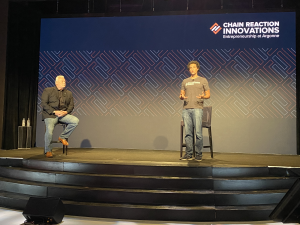In a normal year, some of the brightest entrepreneurs in America might market their technologies to industry representatives at an evening soiree in a downtown skyscraper. But this year, startups embedded in three national laboratories – which are making a name for themselves as innovators – had to improvise.
Representatives from 17 startup companies working with researchers at the U.S. Department of Energy’s national laboratories pitched their businesses in a virtual event as part of Demo Day 2020, a gathering of energy innovators coming together to showcase future possibilities.
These innovators are part of the Laboratory-Embedded Entrepreneurship Program (informally known as LEEP), which pairs entrepreneurs with scientists at three national laboratories. “There’s really nothing like LEEP on the planet, there are no comparables,” said John Carlisle, who directs Chain Reaction Innovations (CRI), the LEEP node located at DOE’s Argonne National Laboratory. “It’s not a start-up incubator, it’s not an accelerator, it’s not a pitch contest – but it’s a little bit of those things combined.”
Entrepreneurs spend two years embedded at either Argonne, Oak Ridge, or Lawrence Berkeley national laboratories, where they advance their technologies before bringing them to the market. “It’s really a one-of-a-kind opportunity to de-risk a technology and build a business around it in order to get it into the market,” Carlisle said.
As part of LEEP, the entrepreneurs presenting at Demo Day also have the opportunity to leverage the expertise and resources of billion-dollar national laboratories. Demo Day marks the midpoint of the two-year development period, when the entrepreneurs are ready to begin unveiling their technologies and making industry contacts.
Creating closer relationships with industry has been the fundamental purpose of LEEP since CRI was founded in 2016. “Making these connections has always been an area in which the laboratories have struggled a little bit,” Carlisle said. “All these labs have a mission to do discovery science, but we also have a mission to drive the impact of that science in the real world.”

Featured Startups
In a world facing the challenge a pandemic, one way to make a significant impact would be to dramatically accelerate medical and environmental testing. Stemloop, one of the CRI startup companies that participated in Demo Day, is focusing on this goal. “Testing in the laboratory is expensive and takes a long time, so that the result you get may no longer be relevant to your needs,” said Khalid Alam, CEO and founder of Stemloop.
Stemloop hopes to give people the ability to sense their environment. This initially involved water quality. Alam is currently working with Argonne structural biologist Andrzej Joachimiak on biosensing for public health testing that is inexpensive, portable and easily available for consumer usage.
Another company, NanoPattern Technologies, capitalized on the virtual nature of Demo Day to build the case for its augmented reality technology based on quantum dot ink for micro displays. “Augmented reality technology is bulky and has short battery life, but if we had tricolor micro-LED displays, we could revolutionize this technology,” said Yu Kambe, co-founder and CEO of NanoPattern.
A third CRI-sponsored company, NUMiX Materials, designs sorbents to recover and solidify critical metals from waste streams. “It’s all about the transition to a new circular economy,” said NUMiX CEO Katie Kolhoff. “There are tenuous links in global critical material supply chains which are fraught with geopolitical risks.”
In looking at capacitive energy storage, Caporus Technologies is focusing on one of the major issues in electric power. “Electric power comes in so many forms, and they don’t always work very well together,” said Kevin O’Connor, founder and CEO. “Power converters are required for our power systems to be integrated, and that’s where our capacitors come into play.”
At the other end of the energy storage and decarbonization challenge are hydrogen fuel cells. This technology is the heart of Celadyne Technologies, the fifth CRI start-up to present at Demo Day. “Connecting fuel cells and electrolyzers would be an elegant solution for providing low-carbon energy, but the problem is that you lose 50 percent of your energy on the fuel cell side alone,” said Gary Ong, founder and CEO of Celadyne. “By finding a material that can survive higher temperatures, we can boost the efficiency of our fuel cells.”
In addition to the CRI companies, other startups sponsored by Oak Ridge National Laboratory (Innovation Crossroads) and Lawrence Berkeley National Laboratory (Cyclotron Road) also participated.
Innovation Crossroads Startups
- Mantapoole Technologies
- American Nanotechnologies, Inc.
- Endeavor Composites
- Electro-Active Technologies
- Neptune Fluid Flow Systems
- Purist
- Grid Fruit
Cyclotron Road Startups
- Brimstone Energy
- Inch Fab
- Cypris
- Aligned Carbon
- Resonant Link
Transforming the Energy Landscape
These three programs are helping launch companies that could transform the energy landscape. “Simply put, these embedded entrepreneurship programs are playing an important role in helping to accelerate the discoveries and the innovations that drive U.S. prosperity and security,” said Argonne director Paul Kearns.
The companies presenting at Demo Day and their technologies have the potential to make a significant impact on one of the most pressing questions of our time. “We need dozens, if not hundreds, of new climate tech solutions to reach net-zero emissions by 2050,” said Breakthrough Energy Ventures managing director David Danielson at the start of the event, who also served as the Assistant Secretary for Energy Efficiency and Renewable Energy from 2012 to 2016. “The LEEP programs fill one of the most important gaps in the climate tech ecosystem, which is at the very front end of the funnel.”
Demo Day is sponsored by the U.S. Department of Energy’s Advanced Manufacturing Office. View a recording of Demo Day 2020 here.

